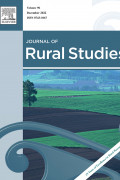Rural governance increasingly involves a broad range of political agents – but whom do rural dwellers consider responsible for creating and maintaining local opportunity structures? Focusing on the issue of places to socialise, our paper investigates resident-municipality relations in peripheralised rural regions of Czechia and eastern Germany. We draw from problem-centred resident interviews using an actor-centred, multimodal concept of responsibility.
Topic: trust/social cohesion, urban and rural studies, care, politics (and political attitudes), public policy
Topic: gender, work, public policy
The aim of this text is to describe and compare the residential segregation of foreigners in Prague and Central Bohemian region in years 2012–2018. The distribution of foreigners is measured using a new method of individualized scalable neighbourhoods. This method allows to compare the distribution of minority and majority population on multiple scales and does not depend on the statistical-administrative division of the territory.
Topic: housing, urban and rural studies, methodology, migration and mobility, public administration
Příspěvek se zaměřuje na stěhování a rezidenční mobilitu cizinců v Praze a Středočeském kraji, kde se soustředí značná část cizinecké populace Česka. Na základě kombinace dvou zdrojů dat ukazuje, že vzhledem ke specifickým prostorovým vzorcům pobytu a pohybu mají cizinci nezanedbatelnou roli v procesu utváření sociálně-prostorové struktury regionu.
Topic: housing, urban and rural studies, methodology, migration and mobility, public administration
This editorial seeks to define fragile pronatalism by highlighting why pronatalism in the examined Central and Eastern European post‐socialist countries should be considered fragile. Moreover, it aims to map desirable future changes in fertility policies in the region. Following a brief presentation of the articles contained in this thematic issue, our concluding thoughts complete this editorial.
Topic: parenting, family
Topic: gender, parenting, family, sexuality
Topic: historical sociology
Topic: historical sociology
Topic: religion and religiosity
Topic: religion and religiosity
Through a qualitative analysis of interviews with 52 men and women with non-heterosexual identities, the article deepens the understanding of parental intentions and the formation of pathways to gay and lesbian parenting in the Czech Republic.
Topic: gender, parenting, family, sexuality
The article is dedicated to reflecting the links between the climate crisis and the Covid-19 pandemic crisis in the context of Czech social media, specifically on several blogging platforms. The processes leading to the climate and pandemic crises are highly intertwined, based in the way humans interact with the environment on a global scale. However, the circumstances and consequences of both crises, as well as the ways they are dealt with, also share common features.
Topic: internet, klimatická změna, media
Švýcarsko je dlouhodobě aktivní v podpoře rovného odměňování žen a mužů, o čemž svědčí přijatá legislativa, institucionální podpora rovnosti žen a mužů a také zpřístupnění standardního analytického nástroje Logib zaměstnavatelským subjektům za účelem kontroly rovného odměňování. I přes výše uvedenou snahu zůstává rozdíl v odměňování žen a mužů ve Švýcarsku vysoký, v roce 2018 činil 19 % v neprospěch žen.
Topic: gender, wages and incomes
Publikace, kterou držíte v ruce, vám přináší přehled vybraných zahraničních dobrých praxí, jejichž cílem je eliminace znevýhodnění mezi muži a ženami v oblasti finančního ohodnocení a dodržování zásad rovného zacházení v pracovní oblasti. V této publikaci se tak můžete setkat s popisem opatření, zákonů, právních norem a nástrojů podporujících genderovou rovnost v oblasti odměňování žen a mužů v následujících zemích: Slovensko, Španělsko, Island, Kanada, Švýcarsko a Velká Británie.
Topic: gender, wages and incomes
Topic: internet, social capital, lifestyle
Topic: kultura
Topic: kultura
Topic: religion and religiosity
This article offers insights into eating practices, conceptualising and making of ‘good’ food by people living with chronic disease. Based on ethnographic research focussing on people with Inflammatory Bowel Disease (Crohn’s disease, ulcerative colitis and undefined IBD) in the Czech Republic, we explore what it would mean to conceptualise disability from the non-normative gut.
Topic: health
Topic: gender, internet, kultura, media







Newsletter
Facebook
Twitter
Tweets by SociologickyNewsletter